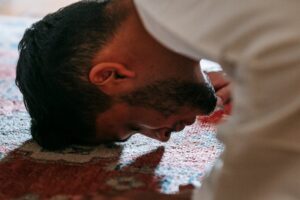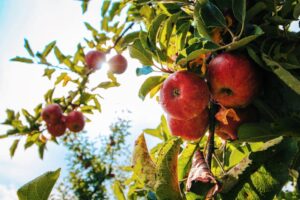The early verses of Quran approached the economic corruption that was present at the time of their revelation in a very unique way. Quran equated economic imbalance to antisocial vices, like scandal spreading and backbiting that disrupt the fabric of the community. “Woe to every scandalmonger and backbiter, who piles up wealth and lays it by, thinking that his wealth would make him last forever.” [104:1-3]
As Prophet Mohammad started to build a new society based on new values, he warned against spreading scandals and backbiting. Such behaviors diminish the solidarity and cohesion of the society, and weaken the nervous system that connects between its members and enables them to respond effectively and collectively to external threats and internal challenges. A society whose social relations and networks are disrupted by antisocial vices lacks mutual confidence and fails to stand up united at the time of calamity and hardship.
What do you expect from a society when its members are separated widely along the faulty line of socioeconomic status?
What type of relations and what degree of mutual love and mercy you expect in a society where the rich and wealthy exploit and alienate the poor and needy?
Quran is truthfully telling us that accumulation of wealth and blocking the channels of economic service leads to social imbalance, the spread of hatred and animosity among people, and consequently to the destruction of social order.
This is absolutely a miscalculation. Miserly piling of money may give the illusion of absolute power and immortality, and erroneously the permission to undermine others and treat them as inferior and subservient subjects. Backbiting and speaking scandalously of them may then seem legitimate and -wrongly- justified. Quran says: this is not the way to build a strong society or for good will to circulate among its citizens. “By no means! He will be sure to be thrown into that which breaks to pieces.” [104:4]
“Hutamah” is literally derived from the verb “destroy” or “disintegrate.” This Quranic verse is telling us that destruction, disintegration, and collapse are the fate of societies that are inflicted by economic imbalance and immoral markets, and infested by antisocial vices. The same fate will be faced in the hereafter, and interestingly hellfire is given the name of “hutamah.” “And what will explain to you that which break to pieces? It is fire of Allah kindled to a blaze, which mounts to the hearts: It shall be made into a vault over them, in columns outstretched.” [104:5-9]
The misers responsible for the economic injustice will be covered and choked in hellfire in the same way they caused the choking of their communities in this life. They imprisoned themselves in the world of things piling and serving them. They lived a life of disharmony, i.e., broken into pieces without integrity. On the Day of Judgment, they will be destroyed into pieces and imprisoned in the vault of hellfire. The latter will mount to their hearts which reflect their actual status. They are bereft of pity, mercy, affection, or charity. They lack understanding, social consciousness, and common sense.
How can the social balance be restored? How is the redistributive justice reclaimed? How can morality be brought back to the market and to the economy?
The early verses in an astonishing gesture commanded the believers to be proactive and part of the solution. “And give regular charity; and loan to Allah a beautiful loan.” [73:20]
Who needs the loan: Allah or the people?
Spending in charity and helping the needy and the poor through beautiful loans are instrumental in establishing social justice. Loans are beautiful when the expected return is not usury or interest but the reward found with Allah.
The poor, the needy, the orphan, or the slaves in any society are the ones who are facing the hardship and the obstacles to good life. The early verses of Quran presented us with a unique approach to solve their ordeal. In a much unexpected way, Quran urged those who have and those who enjoy good life to scale their ascent and overcome their obstacles in the following manner:
“But he has made no haste on the ascent. And what will explain to you the ascent? It is freeing the slave, or giving of food in a day of privation. To the orphan who is a relative or to the indigent in the dust.” [90:11-16]
You scale your ascent and overcome your obstacles when you feed the poor and the orphan or free the enslaved. In other words, you solve your problem by solving theirs. Who knows better about need more than the poor and the orphan? Who knows more about the value of freedom than the enslaved? Help them and you will see the domino effect. Once they are helped, they will become the most capable and the most motivated to help others like them.
What return do you expect from the poor, the orphan, or the slave?
Abu Bakr used his fortune to free slaves as early as he accepted Islam. One day, his father said to him: My son! Why don’t you free strong slaves so they can work for you? Abu Bakr replied: I am doing this for the sake of Allah.
In view of the above verses and their applications we have to revisit and demystify the commonly uttered phrase “for the sake of Allah.” Every action that leads to the benefit and the welfare of the overwhelming majority of the people will have its positive repercussion in our lives and will be generously rewarded by Allah. “That which is for the good of mankind remains on the earth.” [13:17]
A very helpful skill can be generated from this verse. The benefit and the welfare of mankind must determine the truthful direction of our actions.
By Dr. Walid Khayr




